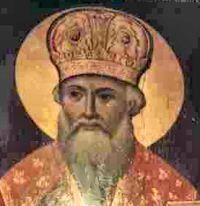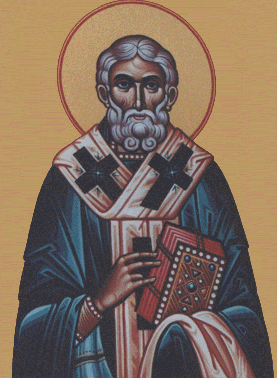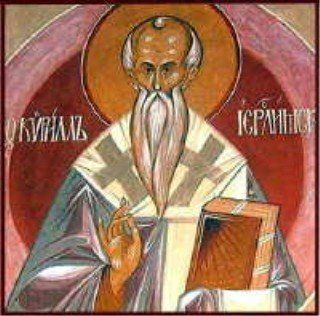Today, July 27, we celebrate the feast day of the Seven Sleepers of Ephesus-- Saints Maximian, Malchus, Martinian, Dionysius, John, Serapion, and Constantine—martyrs for the faith. As recorded in the Golden Legend, the story of the Seven Sleepers is one where good men fall asleep, only to wake up to a world changed for the better. Akin to the resurrection of the body, which we shall all experience on earth, the story of the seven sleepers is a foretaste of the glory of the Risen Christ. The Church’s martyrology describes the feast as the "Commemoration of the seven Holy Sleeper of Ephesus, who, it is recounted, after undergoing martyrdom, rest in peace, awaiting the day of resurrection."
It was during the time of Christian persecution that our story unfolds. Emperor Decius (249-251) traveled to the town of Ephesus (in modern-day Turkey) to enforce his laws against Christians. In Ephesus, Decius found seven noble young men (depicted in art as beardless, and often in legend referred to as “boys”), named Maximian, Malchus, Martinian, Dionysius, John, Serapion, and Constantine. Each of these young noblemen had proclaimed the Christian faith, being baptized into it. Following a brief trial, Decius sentenced them to death, but gave them some time to consider changing their faiths. He declared that should they still be Christian upon his return to the town, they would be executed.
Following his departure, the young men held firm in their faith. They gave their property to the poor, and taking only a few coins with them traveled to a cave on Mount Anchilos to pray and prepare for death. There they lived in hermitude, contemplation, and holy prayer until the emperor returned to Ephesus. Upon his return, he asked their whereabouts, and upon his approach to their cave, the martyrs said their last prayer, giving themselves up, and falling asleep. Decius told his soldiers to find them, and when they were found asleep in the cave, he ordered it to be closed up with huge stones and sealed. Buried alive, and deprived of food and water, the seven became martyrs for the faith. Shortly thereafter, local Christians visited the sealed entrance to the cave, and wrote the names of the seven and their story on the cave wall for all to see. Their sacrifice became a living witness to the Christian faith.
 Two centuries later, during the reign of Emperor Theodosius the Younger (408-450), persecution of Christians had ceased in Europe. In fact, Christianity was now the official faith of the empire. In is during this time that some heretics denied the resurrection of the body. While this controversy went on, a rich landowner named Adolios had the Sleepers' cave opened, to use it as a cattle-stall. The seven youth awoke from their sleep, unaware that almost two hundred years had passed. Their bodies and clothing were completely undecayed. They discovered they were preserved when one went into the city to buy bread and heard the name of Jesus spoken freely, presenting an outdated coin with the image of Decius to buy bread. Bewildered he was taken to the Bishop of Ephesus who eventually spoke to all seven youths and discovered that God allowed this miracle to end the dispute concerning the resurrection of the dead. The Emperor also went to Ephesus to examine this miracle and after speaking with them they were allowed to go back into their cave without the royal honors the Emperor wanted to lavish on them, and there they fell asleep permanently. Overall it has been determined that the holy youths fell asleep in the cave in 250 and awoke in 434, which means that they slept for 184 years. Each year, their feast is celebrated in the cathedral built atop the cave. The cave in which their bodies were found became a place famous for devout pilgrimages, and is still shown to travelers.
Two centuries later, during the reign of Emperor Theodosius the Younger (408-450), persecution of Christians had ceased in Europe. In fact, Christianity was now the official faith of the empire. In is during this time that some heretics denied the resurrection of the body. While this controversy went on, a rich landowner named Adolios had the Sleepers' cave opened, to use it as a cattle-stall. The seven youth awoke from their sleep, unaware that almost two hundred years had passed. Their bodies and clothing were completely undecayed. They discovered they were preserved when one went into the city to buy bread and heard the name of Jesus spoken freely, presenting an outdated coin with the image of Decius to buy bread. Bewildered he was taken to the Bishop of Ephesus who eventually spoke to all seven youths and discovered that God allowed this miracle to end the dispute concerning the resurrection of the dead. The Emperor also went to Ephesus to examine this miracle and after speaking with them they were allowed to go back into their cave without the royal honors the Emperor wanted to lavish on them, and there they fell asleep permanently. Overall it has been determined that the holy youths fell asleep in the cave in 250 and awoke in 434, which means that they slept for 184 years. Each year, their feast is celebrated in the cathedral built atop the cave. The cave in which their bodies were found became a place famous for devout pilgrimages, and is still shown to travelers.The lives of the Seven Sleepers marks a true historical event. While the length of their sleep, and the eventual resurrection of their bodies is difficult to confirm, archeological remains indicate that seven young men were buried in the cave in question in Turkey—the tombs and relics remain, dated from the time period in which the miracles were said to have occurred. The lives of the Seven Sleepers are recorded in numerous sources, including the Koran.
The Seven Sleepers give us hope and confidence in the Lord. Whether historically accurate, or a more mystical metaphor for the joy of the resurrection, we look forward to the moment when our sleeping selves awaken to grace, and purified, and then rest in the Lord for all eternity!
From the Lives of the Seven Sleepers (as recorded in the Golden Legend):
And as soon as the blessed saints of our Lord saw the emperor come, their visages shone like to the sun. And the emperor entered then, and glorified our Lord and embraced them, weeping upon each of them, and said: I see you now like as I should see our Lord raising Lazarus. And then Maximian said to him: Believe us, for forsooth our Lord hath raised us tofore the day of the great resurrection. And to the end that thou believe firmly the resurrection of the dead people, verily we be raised as ye here see, and live. And in like wise as the child is in the womb of his mother without feeling harm or hurt, in the same wise we have been living and sleeping in Lying here without feeling of anything. And when they had said all this, they inclined their heads to the earth, and rendered their spirits at the command of our Lord Jesus Christ, and so died. Then the emperor arose, and fell on them, weeping strongly, and embraced them, and kissed them debonairly. And then he commanded to make precious sepulchers of gold and silver, and to bury their bodies therein. And in the same night they appeared to the emperor, and said to him that he should suffer them to lie on the earth like as they bad lain tofore till that time that our Lord had raised them, unto the time that they should rise again. Then commanded the emperor that the place should be adorned nobly and richly with precious stones, and all the bishops that would confess the resurrection should be assoiled. It is in doubt of that which is said that they slept three hundred and sixty-two years, for they were raised the year of our Lord four hundred and seventy-eight, and Decius reigned but one year and three months, and that was in the year of our Lord two hundred and seventy, and so they slept but two hundred and eight years.





























